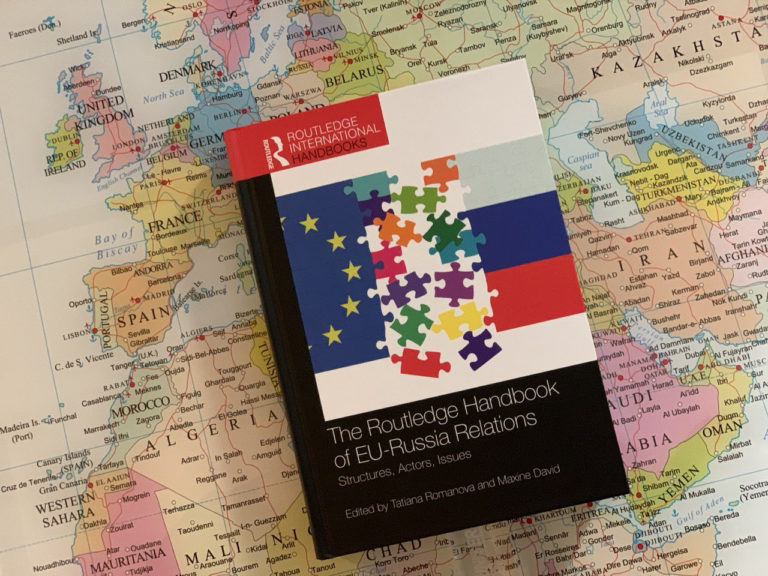

Roundtable discusses the role of academia in EU-Russia relations
The event titled ‘Engaging Policy Makers with the Academia’ gathered researchers and official representatives from both Russia and the EU to present and discuss the recently published Routledge Handbook on EU-Russia Relations. Through 40 chapters, many written by EUREN members, the book sheds light on the multifaceted relations between Moscow and Brussels. Its comprehensiveness and depth make it a milestone in the field.
At the roundtable, lively discussions engaged policy makers from the European Commission, the Russian Ministry of Foreign Affairs and the Eurasian Economic Commission into fruitful exchange over the potential that scientific debates hold for the development of EU-Russia relations. The online event was well received, with about 70 participants and many more following the livestreams. It was moderated by the Handbook’s editors Tatiana Romanova and Maxine David, as well as Janis Kluge and Ivan Timofeev, representing EUREN and RIAC, the co-organizers of the event.
A first panel discussed the role of academic cooperation for policymaking in EU-Russia relations. Presenting their contributions to the Handbook, Sabine Fischer and Larisa Deriglasova highlighted that while diverse epistemic communities in EU and Russia do exist, they lack the cohesion necessary for conveying common positions to policymakers. Yet, the speakers emphasized the potential of exchange-formats like EUREN to form trust, to share opinions, and to continue cooperation in times of tension. In his comment, Russian Ministry of Foreign Affairs representative Alexander Gusarov underlined the importance of a level playing field for scientists in Russia and the EU. Despite the many existing disagreements, he stressed the value of academic cooperation as a “positive inter-societal force” to build trust and generate fresh ideas – especially in areas where perspectives diverge most.
Two areas of special significance to EU-Russia relations – energy and the Arctic – were discussed on the second panel by Irina Kustova and Alexander Sergunin. Perceivable “changes in addressing and taking climate change seriously” on the Russian side suggests high potential for mutual engagement with the EU along changing interdependencies of their energy relationship. According to Irina Kustova, greater sectoral cooperation, however, can go both ways – sparking closer ties or institutionalizing conflict. The Arctic is an area where Alexander Sergunin observes a spillover of general tensions – despite positive developments in EU-Russia cooperation on the field for many years. Representing the EU Delegation to Russia, Julita Pons underscored the importance of preserving existing areas of sectoral cooperation. This requires “concerted effort on both sides not to let these areas become hostage of our overall political relations.”
A final round of discussions touched upon the significance of regional structures for EU-Russia dialogue. Sergey Utkin shed light on patterns of regional multilateral organizations. According to his analysis, the marginalization of existing platforms like the Council of Europe and the OSCE has obstructed opportunities for closer engagement. Laure Delcour, for her part, focused on EU-Russia interaction in the shared neighbourhood. Existing scholarship, she argued, misses that EU and Russian policies towards this region are intertwined with domestic debates of the countries in question. In many analyses, the “countries in between [Russia and the EU] have remained a missing variable”. What is needed are thus more in-depth inquiries into local perceptions and identities in the region. Elena Danilova from the Eurasian Economic Commission highlighted economic cooperation and suggested strengthening the dialogue between the EAEU and the EU.
The differentiated analyses presented at the roundtable were illustrative of the invaluable input academia provides for the making of EU-Russia relations. Both the Russian and the EU representatives highlighted the importance of ‘trust’ for genuine cooperation. According to Gusarov, academic debates between the EU and Russia can help in that they can “envision the possible landing-zones, possible compromises in many different areas.”


